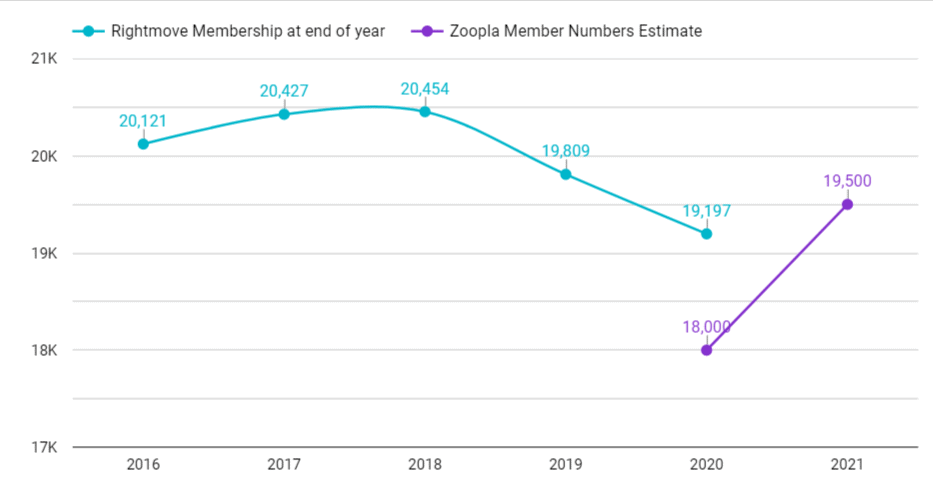
Rightmove is the market-leading property portal in the UK and a paragon of profitability. Often held up as the example for others around the world to follow, the Milton Keynes based company has profit margins unrivalled by any other property portal and a market cap that has flirted with the £7 billion mark. The portal recently recorded record traffic of 9.1 million users per day and its brand has never been stronger, but here is the first of several dichotomies explored in this analysis of Rightmove's business.
In a business where the sole purpose is to market property, the logic used to run that the more eyeballs on the merchandise, the better the company was doing its job. Essentially the industry axiom was that more traffic meant you could attract more agent customers and charge them higher prices.
Back in January, I wrote an article on the changing role of property portals in society in which I made the assumption that there was still some sort of "correlated relationship" between traffic and revenue. Later that same day Rightmove published its yearly report and made my words look antiquated.
Obviously, the listing package discounts that the portal was forced reluctantly to concede to agents throughout the pandemic along with the shifting role of leading portals towards fulfilling entertainment intent and away from fulfilling transactional intent have led to a huge gap between traffic and revenue at Rightmove.

Source: REA Group annual reports
The January article also included the words "there is rarely a case on the internet in which increased traffic does not lead to increased revenue" - this very much appears to be one of those rare cases. Although I suspect that it might be the most stark case, Rightmove is not alone in seeing this trend of an upturn in traffic at the same time as a downturn in revenue. Australian market leader Realestate.com.au saw a similar trend in 2020.

Source: REA Group annual reports
Can we expect these portals to turn to more third-party advertising and data selling in 2021 as their users' intention slowly shifts and their traditional revenue from agents fails to follow the upward trajectory of their traffic?
Where the link between traffic and revenue has been broken by covid, the link between Rightmove's profits and how much it is able to charge its agent customers is as evident as ever.
For many years Righgmove's business strategy seems to have been to get agents hooked on its listings services and then increase the price. While it has clearly worked for a long time and any public company might be forgiven for seeking to do the same, the fact that its profits seem to be so intrinsically tied to its ARPA (average revenue per advertiser) might be a cause for concern for investors.

Source: Rightmove annual reports
Where direct rival Zoopla has long been following a path of diversification and has been getting into different parts of the property transaction and adjacent industries through its price comparison, agency software and insurance businesses, Rightmove has steadfastly maintained its course as a pure-play classifieds business. When it can't charge agents as much, either because of a global pandemic or because its agents are in open rebellion, its balance sheet suffers greatly.
Rightmove's institutional reverence of the ARPA metric is perhaps best highlighted in the company's 2018 annual report (the year that the portal achieved a monthly ARPA of over £1,000 for the first time).
"ARPA growth will continue to be driven by increased product penetration, pricing and innovation and is underpinned by the value of our unrivalled audience"
"In 2018 despite the slightly cooler housing market Average Revenue Per Advertiser (ARPA) passed £1,000 for the first time to reach £1,005, demonstrating the value of the products and services we offer our customers."
The second quote neatly brings us on to the third point of this analysis...
In Rightmove's investor presentations in the 'risks' sections, the first risk stated every year is always the threat of a downturn in the property market. Potential investors are told that Rightmove is "dependent on the macroeconomic conditions surrounding the UK housing market".
You might be forgiven for thinking that as a company which in 2020 derived more than 98% of its revenue from the domestic UK housing market, Rightmove's value as an entity would be intrinsically linked to the ebbs and flows of that market. However, it would appear that from 2019 onwards Rightmove's value as a company that markets houses has not necessarily been tied all that closely to the housing market in which it operates. To quote Rightmove's former Finance Director in the company's 2019 presentation:
"The strength of the Rightmove subscription business model was once again demonstrated during 2019 with a robust financial performance, despite the backdrop of Brexit and an uncertain UK housing market"

Source: Rightmove annual reports and official UK Government housing statistics
Now obviously there are caveats with these numbers, the main one being that like most companies, Rightmove's market cap fluctuates quite a lot and that looking at this metric as a static photograph on one date when the balance sheet for the year was finalised may not be wholly reflective of the situation.
However, 2019, in particular, seems to have been a bumper year for the company with record revenue, profit and a leap in market cap which went from just under £4 billion when the accounts were done for 2018 to £5.5 billion the next year; this despite what their own people described as an uncertain market in which home sale volumes dropped 0.8% on the previous 12 months.
The obvious question here is 'if Rightmove grew significantly as a company in 2019 despite a lacklustre housing market, how did they do it?' It's perhaps not a coincidence that the headline-generating agent pressure group SayNoToRightmove was started in early 2020 with the portal riding high on the back of these results.
So after a down year where does Rightmove turn? There may be signs that the classifieds behemoth might be trying to stamp its authority in the more fragmented rentals market. The company recently started its first-ever national ad campaign specifically targeting renters. Other avenues it could look to include following Zoopla down the diversification path and trying to get involved in more areas adjacent to property transactions or (much less likely) following Zillow by using its brand recognition to bring all aspects of the property transaction under one roof.
Like sharks, publicly traded companies like Rightmove must always move forwards and at the start of the year, news started filtering through that the portal was once again turning to its trusted tactic of increasing ARPA, much to the annoyance of some of its customers. Rightmove's argument will be, as it has always been, that it is worth the money that agents pay as a source of leads. If anyone needed a reminder of whether this argument has worked for Rightmove for the last ten years or so, they need only look at the company's operating margins which at their peak were over 75%.
All of which makes new technology to track portal leads a lot more important. Companies like homehere are increasingly better able to track and attribute portal leads and give agents a much better picture of the ROI they are getting. If the data from a 2021 report into portal ROI can be expanded, the edifice of Rightmove's argument might start to crumble and some agents may have the justification they needed to take the plunge and leave Rightmove. They may not be many in number initially but it could well be enough to significantly hurt the portal both in terms of bottom line and, perhaps even more importantly, PR not only in the agent community but among the general portal-going public as well.

Source: Rightmove annual reports and Zoopla press releases
There are signs that the market-leader tag might be slipping. Comparisons with privately-owned Zoopla are obviously a bit fraught because we don't have access to its numbers, but according to a recent press release from Zoopla, their listing agency branch numbers are up at around 19,500 with 2,400 extra agencies having signed up over the last 12 months. Given that Rightmove's 2020 agency numbers were around 300 branches lower than this we can say that Zoopla may well be close to market leadership in terms of coverage and leadership in terms of traffic and profits could well follow.
While a company with a brand as strong as Rightmove's should never be written off, clearly the firm has a few challenges laid out before it to deal with over the next year or so. It will be interesting to see whether the strength of Rightmove's brand and traffic can get it back to its 2019 levels or whether traffic, quality leads and investor confidence drop along with inventory. The essential problems of the classifieds business model are all playing out in Milton Keynes and there will be many interested spectators.